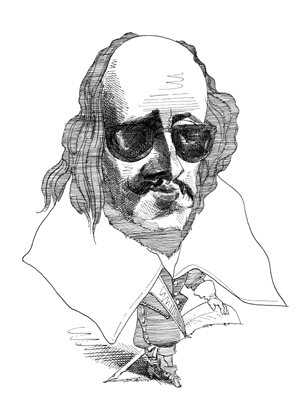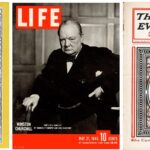Adam Gopnik has a good essay in this week’s New Yorker about why reading Shakespeare is still essential, as he reviews Stephen Greenblatt’s new book “Will in the World.”
“Greenblatt’s book is startlingly good—the most complexly intelligent and sophisticated, and yet the most keenly enthusiastic, study of the life and work taken together that I have ever read,” says Gopnik of the Harvard professor’s book. “Greenblatt knows the life and the period deeply, has no hobbyhorses to ride, and makes, one after another, exquisitely sensitive and persuasive connections between what the eloquent poetry says and what the fragmentary life suggests. A fully postmodernized critic, he knows the barriers of rhetoric and artifice that make us write the poems and then have the feelings as often as we have the feelings first. But he does not make the postmodern mistake of overestimating those barriers, either. Poets may often write things they do not feel, but they rarely feel things that they do not, sooner or later, write. The absence of one emotion in Shakespeare, the undue intensity of another are powerful indicators of a mind and a man at work.”
Shakespeare could have been motivated by his father’s financial difficulties, writes Gopnik. Perhaps this worldly ambition combined with poetic inspiration is what drove Shakespeare to write two plays a year for twenty years and “made him perhaps the wealthiest writer in England,” says Gopnik.
 “Shakespeare was something close to an overnight sensation before there were any,” writes Gopnik in the New Yorker. “He began working in London in the late fifteen-eighties, and b the early nineties he was among the most famous writers in the country. He managed, as few have done since, to play a perfect lowbrow-middlebrow-highbrow trifecta. His fame rested on his popular comedies: “The Comedy of Errors†and “The Taming of the Shrew.†His middlebro fame was made by his history plays, particularly by the now rarely performed three plays on the life of Henry VI—the snobbish wits of the day wer impressed by those, and began writing history plays of their own. He made a highbrow and aristocratic reputation with his polished neoclassica poems, “Venus and Adonis†and “The Rape of Lucrece.””
“Shakespeare was something close to an overnight sensation before there were any,” writes Gopnik in the New Yorker. “He began working in London in the late fifteen-eighties, and b the early nineties he was among the most famous writers in the country. He managed, as few have done since, to play a perfect lowbrow-middlebrow-highbrow trifecta. His fame rested on his popular comedies: “The Comedy of Errors†and “The Taming of the Shrew.†His middlebro fame was made by his history plays, particularly by the now rarely performed three plays on the life of Henry VI—the snobbish wits of the day wer impressed by those, and began writing history plays of their own. He made a highbrow and aristocratic reputation with his polished neoclassica poems, “Venus and Adonis†and “The Rape of Lucrece.””
This is a great essay about what seems like an interesting book. Why read Shakespeare. If I may, one more paragraph from Gopnik’s review: “Greenblatt ends his book with an evocation of the ordinariness of Shakespeare, now seen as a willed ordinariness, a determination not to be wild like the cavaliers or snobbish like the wits, but to see the world as it is. This ordinariness, which runs through all the portraits, is what makes him unique among reigning poets. To have Dante as your reigning poet is a noble but not exactly a daily sort of thing, while Racine and Molière, splitting the honors between them, help give French literary culture its neatly bifurcated shape. Shakespeare’s normalcy is not philistine or easy—in his plays, people lose hands, eyes, wives, minds, lives—and it entails a conservative obeisance to the common order: he believes in kings, bosses, authority. But he does not believe too much in those things, and in this lies the beginning of sanity. His skepticism is rooted not in a moral principle, much less a religious dogma, but in the observer’s eye for how many daily things—the cycle of seasons, lust, and laughter—escape a single rule:
“Fear no more the heat o’ the sun
Nor the furious winter’s rages;
Thou thy worldly task hast done,
Home art gone, and ta’en thy wages:
Golden lads and girls all must,
As chimney sweepers, come to dust.”






